![[LWN Logo]](/images/lc.png)
![[Timeline]](/images/Feature.png)
![[LWN Logo]](/images/lc.png) |
|
![[Timeline]](/images/Feature.png) |
| Daily news | Weekly news | Linux Stocks | Penguin Gallery | Book Reviews | Contact us |
The following interview was performed by Maya Tamiya of ChangeLog during the Japan Linux Conference '99 in December, 1999.
Dirk is a vice president, Strategic Development at SuSE, a German Linux distributor, and also a vice president at The XFree86 Project, Inc.
SuSE is the biggest Linux distributor in Europe, and has been providing commercial distribution since 1992. It has 220 employees around the world, and is expanding its business in the US, too. SuSE also provides technical support and consulting as well as OS. It is now planning to expand its business in Asia.
We would like to thank Dirk for managing his very tight schedule to be with us in spite of our sudden request and answering to our questions very gently and courteously.
We also would like to thank Chris Simmons who helped us to realize the interview, and JLA members for managing the conference.
Dirk's keynote was a one on XFree86, so we asked mainly about SuSE and other issues during the interview.
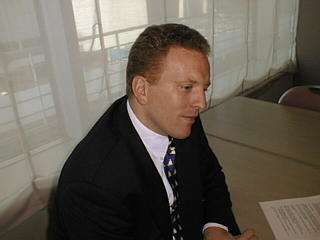
CL: We understand that SuSE's distribution is internationalized (according to SuSE's ads on lwn.net :-), but is there any plan for SuSE Linux's Japanese version, or SuSE's subsidiary in Japan?
Dirk: Yes, SuSE Linux has German, English, French, Italian, Spanish and Brasilian-Portuguese versions. We see Japan as one of the most important markets and are looking for business partners in Japan and are planning to open an office as well. (Dirk had to leave Japan on the first day of the conference, soon after giving his talk due to scheduling conflicts, but we saw Chris (Director of Marketing, SuSE USA) on the next day, too!)
CL: How do you pronounce SuSE, by the way?
Chris: Its pronunciation is a one between "suze" and "suza". (This notation probably makes sense only for Japanese...) For Japanese market, we want to use "su-sa" (in katakana - nigoranai).
Dirk: SuSE is actually an acronym for "Software and System Development" in German. At first, SuSE was a local German company and didn't think the company would be so worldwide then, thus this name.
CL: Would you tell us briefly about what SuSE's distribution is like? What is the most outstanding point of it, compared to other distributions?
Dirk:
SuSE Linux is the most comprehensive Linux operating system available.
On six CDs or one DVD you get more than 1500 packages, including all the
pieces of a viable operating environment, notably the full base
operating system, all tools for the internet, both as client and as
server, an office suite, and a number of commercial applications as
demos or somewhat restricted releases.
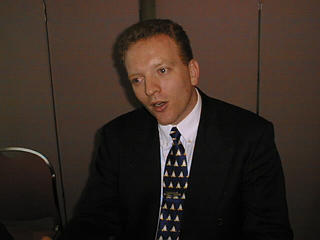
CL: How is SuSE planning to succeed in Japanese Linux distribution market? (as for distributions for Intel-based systems) We have Red Hat and Turbo that are popular among enterprise users, Laser5 and Vine that are popular among consumers, Plamo that is Slackware-based and popular among conservatives, Kondara that is Raw Hide-based and popular among innovators, Storm, Corel and Caldera that have already announced to Japanize, and Mandrake that has unofficial Japanese version. We also have community-based and hobby distributions, and those run on Windows, and of course, Debian supports Japanese. And probably to your surprise, FreeBSD also has lots of users especially here in Japan.
Dirk: I am well aware of the available distributions, and actually know some of the people behind the Japanese versions of FreeBSD and Linux for the PC98. The competition in the Linux market is what makes this market so interesting, and what provides the main differentiating factor between this market and other, more monopolistic parts of the IT industry. We are facing very similar competition in all markets that we are active in, and believe that the same reasons for success apply. Understanding the customer's needs and providing high-quality technical solutions to these needs is how we are planning to succeed.
CL: SuSE IPO? or, isn't there even a rumour among developers? (if it's not already happened in Germany)
Dirk:
SuSE has not gone public yet, it is currently privately held, but just
recently received an investment from Apax and Intel.
Other than that, I cannot really comment at this time.
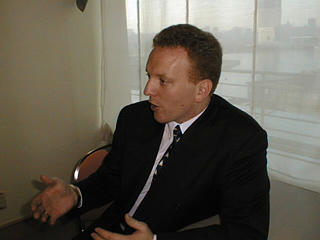
CL: If it would happen, would it happen in Germany?
Dirk: SuSE is a German Linux company, and in fact, the biggest one in Europe, but as for this question, no comment.
CL: Is SuSE planning about community offering, too?
Dirk: Yes, of course, but it is premature to speculate about details at this point.
CL: What do you think made SuSE so successful in Europe?
Dirk:
We understand the European market and the local (and localisation) needs
of our customers. We have an operating system that is complete, is very
easy to install and to administrate. We focus on the quality of our
product and are a significant part of the development effort that makes
Linux happen.
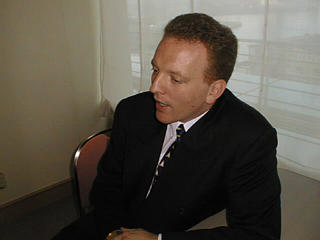
CL: Would you give us your comment on Red Hat's acquisition of German distribution, DLD?
Dirk: I usually do not comment about business decisions of other companies.
CL: We understand that you are a full-time developer at SuSE, but in practice, how many hours do you write codes a day?
Dirk:
I am no longer a full-time "developer". Now I do two or three hours
developing and most of the time I'm engaged in managing, for example,
releasing XFree86 and reviewing codes that other people wrote... when
you have many people contributing the source code, you need to be very
selective, trying to figure out who is contributing the high quality
code, or who is maybe a beginner... So, maintenance of the code, and
management of the team can sometimes become the large part of your
time.
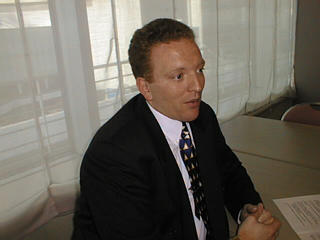 In the early days of XFree86, I used to do a lot of coding, though.
I contributed to a lot of what is now in the XFree86 release. But
these days, most of the time left that I use for XFree86 is spent
consolidating the patches that are all sent, releasing the
codes... somebody have to take charge of all these things for an open
source development. In the case of XFree86, it turns out that that
somebody is often to be me.
In the early days of XFree86, I used to do a lot of coding, though.
I contributed to a lot of what is now in the XFree86 release. But
these days, most of the time left that I use for XFree86 is spent
consolidating the patches that are all sent, releasing the
codes... somebody have to take charge of all these things for an open
source development. In the case of XFree86, it turns out that that
somebody is often to be me.
CL: Are you satisfied with that?
Dirk: Yes. Managing a project is also challenging and very interesting. (Dirk also mentioned that managing a company is also challenging and interesting.)
CL:
Where do you position yourself, among these three: Free Software
movement (like RMS), Open Source movement (like ESR), or "Free Beer"
movement(?) (like Linus :-)?
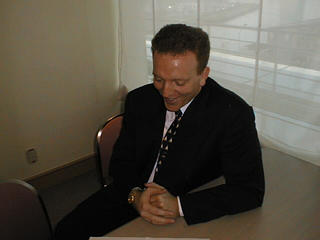
Dirk: Well, "Free Beer" is just a joke... I definitely position myself in the Open Source movement. Open source codes are, like other scientific researches, reviewed by developers around the globe by being released on the Internet, and this can make higher quality software. Doing open source means that you have the positive effect of peer review. You have other people looking at your code, pointing at problems and improving the code. I strongly believe that open source is the best way to do operating system development and infrastructure development. Anything that is used to drive computers, or anything that is used to make computers inter-operate, can only benefit from being open source, because in that way, it can be open to public review. Having open source allows people to fix problems as they occur, and also allows you to fix them yourself. Additionally open source is the only way to be able to review security relevant code for its correctness. And most of the code in the OS and infrastructure environment is security relevant in some form or other.
CL: You have probably been thinking like that, even before the foundation of the Open Source Initiative (which is rather recent)...
Dirk: Yes, I have thought this way since I started doing Open Source development in 1991.
CL: And your purpose seems to be concentrated in quality of software and not in the issue of freedom as much as the Free Software Foundation?
Dirk: FSF including RMS have been developing great software, and I think what they do is one of many ways. I, myself, is not so... well, religious? in free software.
CL: And XFree86 is being a successful example of the large effort of open source development...
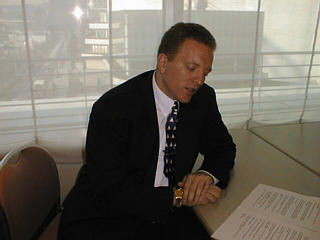 Dirk:
Yes, currently, 650 developers work for XFree86. These people are
literally from all over the world, with variety of backgrounds. Even
though we all share the same goal which is to have a good
implementation of X, individual goals can be very different. For
example, some people that are involved in the team are commercial
developers. These people are paid for this by the companies like
SuSE, VA Linux, and other Linux related companies. Other people do
this in their spare time, because it's a lot of fun and it's very
exciting. And it's very rewarding, too. It's rewarding to get an
e-mail from a person that says "Thank you, my graphic card now works."
Though as small as this reward can seem, it still drives majority of
us to do what we are doing.
Dirk:
Yes, currently, 650 developers work for XFree86. These people are
literally from all over the world, with variety of backgrounds. Even
though we all share the same goal which is to have a good
implementation of X, individual goals can be very different. For
example, some people that are involved in the team are commercial
developers. These people are paid for this by the companies like
SuSE, VA Linux, and other Linux related companies. Other people do
this in their spare time, because it's a lot of fun and it's very
exciting. And it's very rewarding, too. It's rewarding to get an
e-mail from a person that says "Thank you, my graphic card now works."
Though as small as this reward can seem, it still drives majority of
us to do what we are doing.
CL: Would you give us your comment on the future of Open Source software and proprietary software? Do you think that proprietary software will survive in the future, too?
Dirk: Open source is especially great in reviewing codes. So, for example, in regard to security, you can confirm that there is no back-doors made by some other party when you send your confidential document by yourself, without consulting with the vendor of the software you use. But I, myself, generally have no problem with proprietary software. I think that in the future, most of infrastructure-level or security related software will be open source, but proprietary software will be used for more application part, and I have no problem with that.
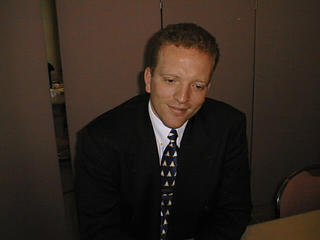 CL:
Would you give us your comment on the recent problem between Sun and
the Blackdown team?
CL:
Would you give us your comment on the recent problem between Sun and
the Blackdown team?
Dirk: This was a major example of PR failure. I don't think that Sun had the intention of stealing Blackdown team's codes, but this was a big problem of marketing... I think Sun was very surprised by the community's response. I do feel sorry that the Blackdown team's developer had resigned, though.
CL: Hardware vendors' responses seem to have changed greatly over the year 1999, but how do you actually feel?
Dirk: I'm very pleased with that. A few years ago, it was very difficult to have their hardware specs... but we'll be seeing video-chip makers releasing their drivers for Linux within their CD-ROMs! It's no longer that only free software developers are trying to implement the drivers, it is now that Linux becomes so important that the companies creating hardware actually write drivers themselves... Hardware vendors sell hardware, this sounds like a tautology, though. They should not have problems releasing their drivers.
CL: What do you think made this happen?
Dirk: Well, I think it happened because the Linux and the open source market has come to be so big now.
CL: Is there any changes occurred by the fact that XFree86 joined the X.org?
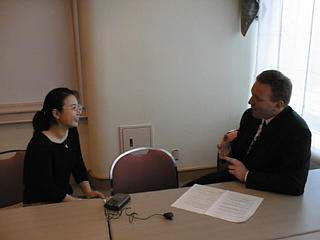 Dirk:
XFree86 has been the main source of new development for the X Window
System for a while. Back in 1994 we formed a corporation (The XFree86
Project, Inc.; I happen to be the Vice President of this corporation) in
order to join the X Consortium. After the OpenGroup interlude, now X.Org
is the steward of the specs and we are happy to be working with them in
order to advance the X Window System further towards an even more viable
solution for the desktop.
Dirk:
XFree86 has been the main source of new development for the X Window
System for a while. Back in 1994 we formed a corporation (The XFree86
Project, Inc.; I happen to be the Vice President of this corporation) in
order to join the X Consortium. After the OpenGroup interlude, now X.Org
is the steward of the specs and we are happy to be working with them in
order to advance the X Window System further towards an even more viable
solution for the desktop.
CL: Would you give us your comment on Hothouse at Atlanta Linux Showcase?
Dirk: Hothouse was a great success! We had a lot of fun there, and we could get amazing result, too. I had met some of the developers individually before, but the only problem was that not all programmers can afford for flight to meet together at once. SuSE sponsored it. We could talk about codes and designs face to face, and this result was so great that actually it was extended from three days to four days. We will do Hothouse again in 2000, extending it to a full week, in fact, and keep doing it afterwards.
CL: So SuSE must be happy with the results, too?
Dirk: Yes, very happy. SuSE is also supporting many open source projects other than XFree86, and in fact, they encourage me to work on XFree86 more during my working hour!
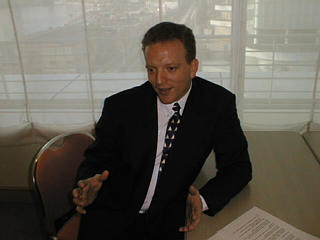 CL:
What was the biggest (or most surprised) affair (or event) of 1999,
with regard to XFree86, and with regard to Linux/open source as
a whole, respectively?
CL:
What was the biggest (or most surprised) affair (or event) of 1999,
with regard to XFree86, and with regard to Linux/open source as
a whole, respectively?
Dirk: With regard to XFree86, Hothouse. With regard to Linux, the rush of Linux companies' IPOs... Red Hat, Cobalt Networks, VA Linux...
CL: Then, what do you think will be the biggest (or most surprised) affair (or event) of 2000, with regard to XFree86 and with regard to Linux/open source as a whole, respectively?
Dirk: Well, I'm not a very good fortune teller, and besides, I left my crystal ball at home :-) But, with regard to XFree86, new 4.0 release. ...I don't know what will be the biggest thing in 2000 with regard to Linux and open source... but I'm sure it will keep being successful!